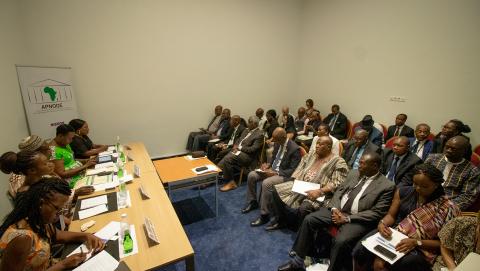
The APNODE panel session at the 9th AfrEA titled “Strengthening evaluation capacity in developing countries: challenges and opportunities” highlighted key success factors and lessons learned in pushing evaluation capacity development at the legislative level. Chaired by Mr. Debazou Yantio, Principal Evaluation Officer at the African Development Bank, the panel included Hon. Evelyn Mpagi-Kaabule, APNODE's Vice-Chair (Uganda); Hon. Olipa Myaba Chilu, Member of Malawian Parliament; Ms. Linda Khumalo, Monitoring and Evaluation Officer at the CLEAR-AA[1] and Ms. Nagnouma Nanou Kone of the APNODE Secretariat at the AfDB.
The session was organized in three parts:
In Part 1, Hon. Mpagi-Kaabule and Olipa Chiluba discussed the factors favouring or inhibiting the demand for and use of evaluative at the legislative level.
During Part 2, Ms Linda Khumalo and Ms. Nagnouma Kone, presented initiatives implemented to strengthen evaluation capacity in parliaments in Africa.
In Part 3, Hon Mpagi-Kaabule and Hon. Olipa Chiluba discussed the roles of multilateral development banks in Evaluation Capacity Development (ECD) initiatives and thanked donors for their support but requested: a) assistance for baseline studies; b) provision of specialists (technical assistance); and c) funding of evaluations to address evaluative needs of parliaments. For that to happen, parliaments should work in synergy with the government on matters related to evaluation during the development of policies.
After the session, APNODE Parliamentarians were given an opportunity for the first time to voice the role of evaluation in their respective countries and how evaluative thinking is instrumental for effective oversight. In addition to the above APNODE Parliamentarians had a discussion with TELE MEDI1 to discuss the role of National Assemblies in using evaluation for good governance.
In addition to the APNODE stand alone session, certain members played prominent roles in various sessions focused on the interface between "Evaluation and Parliamentarians". These included:
- The Global Parliamentarians Forum for Evaluation, UNICEF, APNODE and EvalPartners, pre conference session on "the follow up on the EvalColombo 2018: Progress towards National Commitments", reviewed national commitments towards the Colombo Declaration signed at the EvalColombo 2018. The one day workshop focused on highlighting the importance of parliamentarians' role towards evaluation in the context of Agenda 2030, review progress of national commitments made under the Colombo Declaration 2018, and facilitate dialogue between evaluation community in supporting parliamentarians. Chaired by Hon. Evelyn Mpagi-Kaabule (APNODE Vice-Chair), panelists were: Hon. Abdin Sharif , APNODE EC Member and Member of Parliament for the Republic of Sudan, Ms. Florence Etta from EvalPartners, Dr. Lawal Zakari, Director of M&E, Nigeria, and Mr. Kobena Hanson, Independent Development Evaluation (IDEV) at the African Development Bank (AfDB).
- The Panel Session on “Enhancing Parliamentary Oversight in Africa Using Evaluative Evidence – Challenges, Opportunities and Possibilities” examined the rapidly changing parliamentary landscape in Africa. The session highlighted key initiatives aimed at enhancing parliamentary oversight through evaluative evidence. Kobena Hanson, IDEV/APNODE Secretariat, moderated the session comprised of a panel of parliamentary researchers and experts from across Africa, namely: Ms. Velia Manyonga, Parliament of Malawi, Mr. Shaphic Karenzi, Parliament of Rwanda, Mr. Wilheim Janse van Rensburg, Stellenbosch University, Dr. Mercy Kamau, Parliament of Kenya/APNODE Member and Mr. Andile Mphunga, Parliament of South Africa. The session deliberated on i) the role of citizens in enhancing evidence use in parliament, ii) the use of parliamentary oversight tools, iii) institutionalizing valuations for more effective oversight and iv) evaluative arrangements in legislatures. The panel deliberations and subsequent discussions with the audience, stressed the role of citizens in enhancing evidence use in parliaments, the use of parliamentary oversight tools, evaluative arrangements in legislatures and institutionalization of evaluations for more effective oversight.
- The panel Session “Towards National Evaluation Systems and the Evaluation of the SDGs: A dialogue between parliamentarians and the evaluation community” brought parliamentarians and the evaluation community together to one table to dialogue on strengthening national evaluation policies and systems for achieving Agenda 2030 and commitments of EvalColombo2018. The Session was organized and chaired by Ms. Ada Ocampo from UNICEF, and comprised a panel of Hon. Evelyn Mpagi-Kaabule (APONDE Vice-Chair), Hon. Natalia Nikitenko (Parliament of the Kyrgyz Republic and member of the GPFE), and Hon. Alex Tetteh Djobornoh (Parliament of Ghana/GPFE), and Mr. Kobena Hanson (IDEV/APNODE Secretariat. Panelists dialogued on issues centered around the following questions:
- What role can parliamentarians and parliaments play in strengthening national evaluation capacity?
- Have national evaluation policies helped to strengthen the evaluation practice including decision-making?
- What are concrete steps parliamentarians could take to create a demand for evaluation of the SDGs?
The outcome of the panel was shared with GPFE member parliamentarians, EvalPartners’ ‘Flagship’ countries, and the wider evaluation community.
[1] Center for Learning and Research-Anglophone Africa

